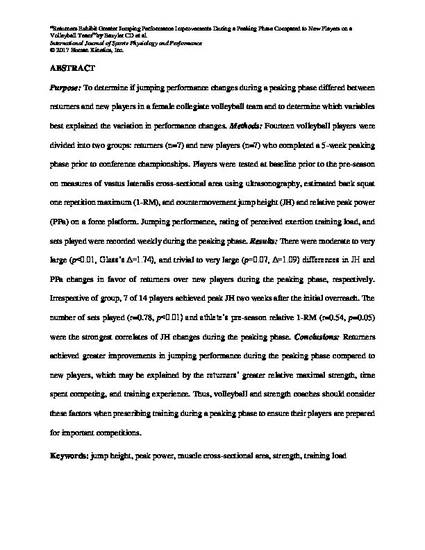
Purpose: To determine if jumping-performance changes during a peaking phase differed among returners and new players on a female collegiate volleyball team and to determine which variables best explained the variation in performance changes.
Methods: Fourteen volleyball players were divided into 2 groups—returners (n = 7) and new players (n = 7)—who completed a 5-wk peaking phase prior to conference championships. Players were tested at baseline before the preseason on measures of the vastus lateralis cross-sectional area using ultrasonography, estimated back-squat 1-repetition maximum, countermovement jump height (JH), and relative peak power on a force platform. Jumping performance, rating of perceived exertion training load, and sets played were recorded weekly during the peaking phase.
Results: There were moderate to very large (P < .01, Glass Δ = 1.74) and trivial to very large (P = .07, Δ = 1.09) differences in JH and relative peak power changes in favor of returners over new players, respectively, during the peaking phase. Irrespective of group, 7 of 14 players achieved peak JH 2 wk after the initial overreach. The number of sets played (r = .78, P < .01) and the athlete’s preseason relative 1-repetition maximum (r = .54, P = .05) were the strongest correlates of JH changes during the peaking phase.
Conclusions: Returners achieved greater improvements in jumping performance during the peaking phase compared with new players, which may be explained by the returners’ greater relative maximal strength, time spent competing, and training experience. Thus, volleyball and strength coaches should consider these factors when prescribing training during a peaking phase to ensure their players are prepared for important competitions.
Available at: http://works.bepress.com/michael-stone/371/

Accepted author manuscript version reprinted, by permission, from International Journal of Sport Physiology and Performance, 2017, 16, 1-26, https://doi.org/10.1123/ijspp.2017-0474. © Human Kinetics, Inc.